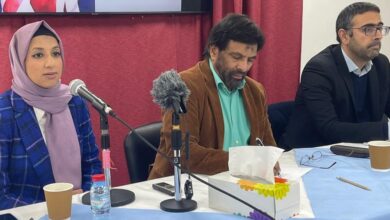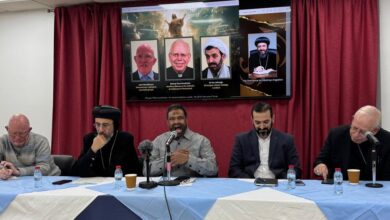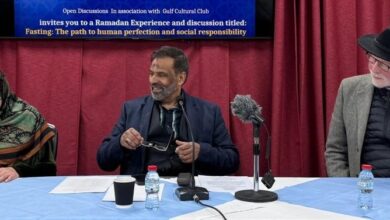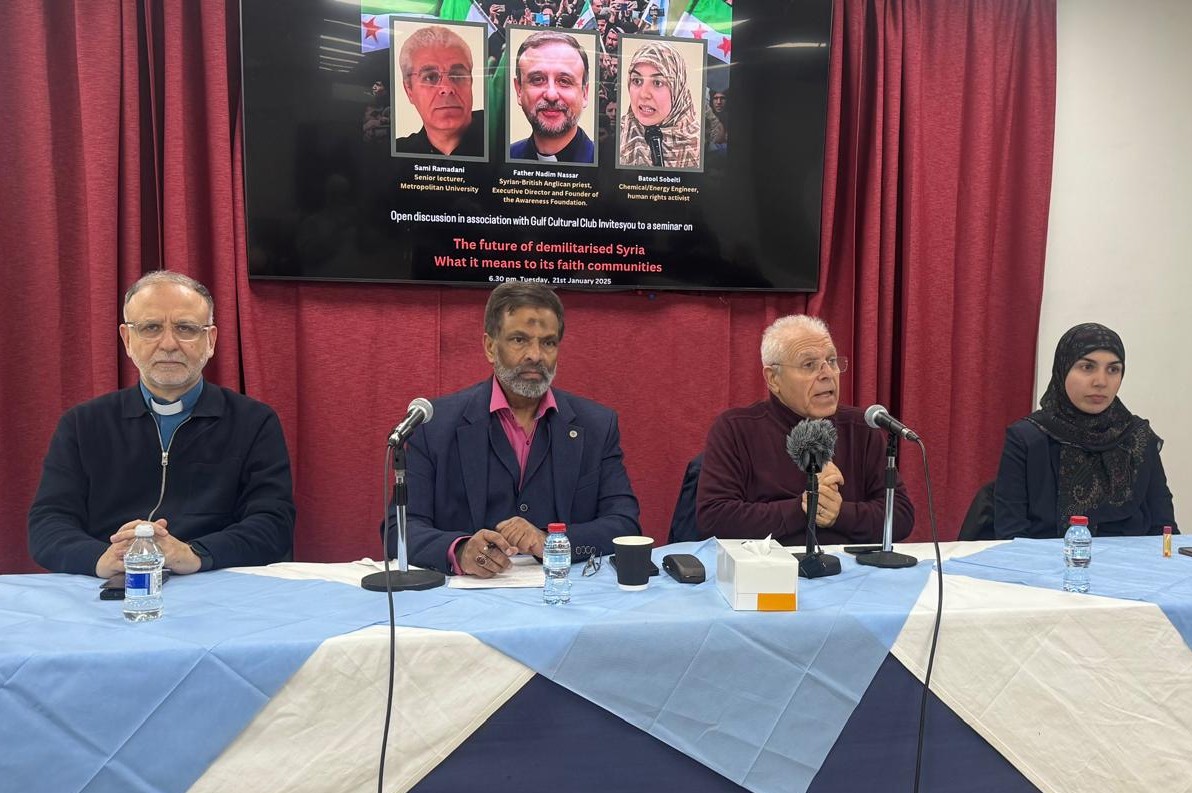
The future of demilitarised Syria.. What it means to its faith communities
Open Discussions –Gulf Cultural Club
The future of demilitarised Syria
What it means to its faith communities
* Sami Ramadani
Senior lecturer, Metropolitan University
** Father Nadim Nassar
Syrian-British Anglican priest, Executive Director and Founder of the Awareness Foundation.
***Batool Sobeiti
(Chemical/Energy Engineer, human rights activist)
Tuesday 21st January 2025
The recent political change in Syria is a seismic event that will have a serious impact on the geopolitics of the region. So far, the real identity of the new rulers has not been fully established or comprehended, but the country will witness ideological, political and social changes. The Assad regime dominated the country for over 50 years and its demise will undoubtedly impact on the country which is now being ruled by an “Islamic” group that may emphasise more on people’s lives than regional politics. Meanwhile Israel has achieved an important goal: the elimination of the military might of the last remaining foe on the border. The debate will deal with the tectonic shift in the balance of power affecting the Palestinian question.
Sami Ramadani: I will say a little bit about Syria’s history just to jog our memories about Syria. There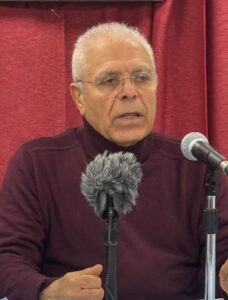 was a division of West Asia which Britain called the Middle East. After the Sykes Picot Agreement between Britain and France the entire area was divided between the two winners of WW1 and Syria was to be controlled, effectively colonised by France..The struggle for independence ensured and Syria got its independence in 1946.
was a division of West Asia which Britain called the Middle East. After the Sykes Picot Agreement between Britain and France the entire area was divided between the two winners of WW1 and Syria was to be controlled, effectively colonised by France..The struggle for independence ensured and Syria got its independence in 1946.
Syria had an elected president after that Sukri Al-Quwati who was deposed in a CIA backed coup in 1949. It was probably the first effective coup launched by the CIA after WW2. The CIA itself was established in 1943.
So the commander in chief or the chief of staff of the armed forces, Colonel Husni Al Zaim took over. He was overthrown and executed the same year. There followed a period of instability. There were a number of landmarks and how the struggle for Syria among the big powers became quite important and how the occupation of Syrian lands by Israel was a pivotal event.
The Soviet Union and Syria established relations in the early 1950s. By 1954 Syria got its first shipment of arms from Czechoslovakia signalling friendly relations with the Soviet Union. And from then on relations between the Soviet Union and Syria got stronger culminating in a treaty of friendship. Even though there were periods of tension between the Soviet Union and Syria generally relations remained fairly strong except for a period in the 1970s when Hafez Al Assad became president. He became officially president in 1971 although he took over in some sort of a coup in 1970. He was the father of Bashar Al Assad.
In the 70s Syria was hoping that with Arab support and American support it could regain the Golan Heights. The Golan Heights were occupied by Israel in the 1967 war, the rest of the West Bank, Gaza and the Sinai. Obviously, no government could claim legitimacy while its land is so brutally occupied by Israel in this case.
In the 1970s Hafez Al Assad tried the strategy of befriending Saudi Arabia and other Gulf states and the USA declared Syria to be a factor of stability in the region. But nothing came out of that strategy and Israel consolidated its presence in the Golan heights and there was tacit approval to annex it. People say President Trump might agree with Israel to officially annex the Golan Heights.
The problem of Syria being occupied by Israel remained a very important internal and external factor and the failure of the strategy to befriend Saudi Arabia and others to regain the Golan Heights also led eventually to closer relations between Syria and Iran. Iran experienced a massive revolution in 1979. It gradually became a major power in the region, very anti Israel and very anti the United States. This in itself created the grounds for stronger Syrian-Iranian relations.
I don’t buy into the notion that Syrian-Iranian relations are based on some religious sect strategy. I think there is a common interest between Syria and Iran. The Shah of Iran was Shia. The question of the alliance between Syria and Iran was very much political.
Syria gradually throughout the 80s and importantly in the 90s became extremely important to the growth of resistance in Lebanon and Palestine. Historically Syria always supported the Palestinian cause. Commonly in the Arab world Syria is known as the beating heart of Arabism. It has a history of supporting Palestine. Syria, Palestine and Lebanon were once a common area known as Balad Al Sham. So these common feelings for Palestine run quite deep among the Syrian people.
With the advent of Bashar Al Assad to power Syria continued the policy of the state. I want to talk a bit about the political nature of the Syrian state in a domestic sense. The Syrian government was quite repressive and it was effectively a one party state. It used repression domestically against opposition forces. Its policies towards the opposition forces were also related to foreign interference in Syria. Some were genuine opposition groups but some were also linked to external machinations to destroy Syria and the state.
If I fast forward a bit to 2001 onwards you could see clearly that the USA had a strategy of destabilising Syria internally. In 2001 General Clarke of the USA revealed an important Pentagon document that revealed that Syria is one of seven countries that needs to be overthrown or occupied. Those states were Iraq, Syria, Syria Lebanon and Libya.
So you can date back the fall of Damascus to Tahrir al Sham to that important event. The occupation of Afghanistan, then in 2003 the occupation of Iraq. These seven countries kept coming up as focus of US policy to undermine the state and to overthrow it. The Western media have always portrayed Western activities in support of various groups in Syria as a campaign for human rights and democracy. I think this is nonsense. The groups they supported in Syria especially from 2003 onwards were terrorist groups under the banner of Islam. They co-operated very closely with Israel and the United States. There are documents showing close links between the CIA and these groups especially Al Qaeda and ISIS in Iraq.
The leader Golani who now rules in Damascus is wanted for murder in Iraq . He was actually sentenced to death in Iraq. He was the deputy of Baghdadi who was the leader of the Islamic state. They became friends and associates. ISIS commanders in Iraq were not handed over to the government. They were secretly released in stages in groups. Nobody knows how they were released.
It was only much later on when Golani became emir of Nineveh that his criminal activities became extremely well known in Iraq and he tried and sentenced to death. Within three years he established Jabat Al Nusrah. It is an affiliate of Al Qaeda. He was sent by Baghdadi from Iraq to Syria to set up Jabhat Al Nusrah.
He did so but differences emerged with ISIS in Iraq and he went his own way. Then by 2017-18 he claimed he separated from Al Qaeda and renamed his organization Tahrir Al Sham. This group and other groups in Syria committed major crimes against minorities in Syria: Christians, other Muslims sects, socialists were victims.
This was a total scheme of destabilization. If you consult Wikipedia you will find a entry timber sycamore. This is the name of a CIA operation. Timber Sycamore was a classified CIA program launched in 2012 to provide covert military aid to rebel groups fighting the Syrian government. It was intended to co-ordinate the activities of the UAE, Qatar, Jordan and many other Western countries to co-ordinate their activities.
Although the uprising in Syria started in 2011 I would say it was partly spontaneous. The people in Syria had legitimate demands but there was also a lot of foreign interference and the arming of groups within Syria. So timber sycamore was the name of this CIA operation. It is well documented and it is revealed in various documents including Congress documents.
These groups were largely unsuccessful because most Syrian people were terrified of their activities – especially women, ethnic minorities and religious groups: – generally they became quite worried about the emergence of these terrorist groups and how they became so active within Syria. Most people oppose them not because they loved the government but because they were genuinely terrified of these terrorist groups. They were gradually isolated from the majority of the Syrian people, they started concentrating their forces on various agreements with the government.
Turkey became especially significant in the Syria story because of its northern borders with Syria. It started backing these groups including Tahrir Al Sham and other groups. They were logistically supplied from Turkey. It was always the logistical centre for backing these groups. Eighty eight countries sent thousands of fighters into Syria including China Chechnya and other European countries. The route into Syria was though Turkey. There were CIA and British officers and they used to train Saudi and Qatari personnel in bases in Turkey and send them to Syria.
The government in Syria was quite corrupt and isolated from most of the population. They did not open a genuine dialogue with the Syrian people to achieve some democratic reforms and changes. The Syrian army collapsed.
Syria is an extremely strategic country in the entire region. Israel bombed the Syrian state’s armed forces. The entire infrastructure of the Syrian armed forces was destroyed. Israel moved in and occupied strategic locations. Israeli tanks ae now a maximum of one hour’s drive from Damascus threatening Damascus, threatening the Syrian people and it is obvious that the Syrian people will not stand for this. I hope and wish that their struggle will end in a democratic society.
Father Nadim Nassar: Thank you Sami for the historical analysis. Let me give you the benefit of half a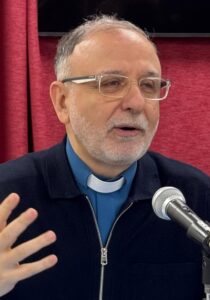 century of experience in Syria. The regime of Assad, the father of Bashar Al Assad, started in 1970 or 1971. But actually the rule of Assad started in 1963 when he made the move against the politically stable democratic government.
century of experience in Syria. The regime of Assad, the father of Bashar Al Assad, started in 1970 or 1971. But actually the rule of Assad started in 1963 when he made the move against the politically stable democratic government.
I was born in 1964. So in 1967 we had the big war with Israel when Syria lost a lot of land including the Golan Heights. I experience 1973 the retaliation. It is called the six day four and I was in Latakia. It is the Mediterranean, a port.
So let me give you another extremely important fact. It applies to all the Levant, the near Eastern regions. You can stir any conflict that conflict by stirring religion. It is a fact and it will not change. If you want to make trouble just talk about religion.
Let me tell you to what extent. Suppose I am a Christian but I never went to church in the life – never. I did not read the bible. I am Christian by ancestry through my family which I did not chose. So suppose I am just a nominal Christian in Syria, Iraq, Lebanon, Jordan or Palestine. The whole Near East region. I did not read the bible and I did not go to church. But if we have a discussion and in that discussion you insulted Jesus Christ or you insulted Christianity. In one second I become more Christian than the pope. And suddenly I become a defender of the faith. This is the extent to how sensitive religion is in that region.
So today they call the government the liberator. I don’t know why. They were not liberators. It was a deal between the UN, Russia ad Turkey. So the three decided that Assad is over. They just marched in. They did not liberate anything.
I will also give you a few important facts of religion also. The majority of the people of Syria are Sunni Muslims. We have a minority of Christians and a minority Druze. They are monotheists. We have Ismailis, Turkoman and the Kurds. They are the biggest minority. They are not a religious minority, they are Sunni. So if you look at the mosaic of Syria you see people living together.
In the 80s something happened in the east of Syria and the Syriac people started leaving Syria. Sweden and a couple of Scandinavian countries plus America and Australia opened the doors to these people and we lost in a decade 300,000 people..
So in the 20th century Syria had around 20 percent of Christians. Now we are three percent. They want to destabilize Syria. We have gas and we have oil. We are one of the biggest exporters of cotton and wheat. So we have a rich country in a strategic location but also a lot of things that the super powers would fight for.
So the dictatorship that came with Hafez Al Assad was brutal. It was based on total terror But the difference between Hafez Al Assad and Bashar Al Assad is that the former was clever and the latter was stupid. Hafez Al Assad could place communities against each other. He could form a kind of imaginary glory by saying that Syria is the beating heart of Arabism which was completely false and completely out of this world. We never belonged to the Arab world. The family belonged to the Alawatis who are hated by the Sunnis. Everybody hates everybody. If you are not like me why are you here?
So the whole regime was based on fear, the house of cards which collapsed a month ago. They terrorized the people. We had the most brutal secret service in the world. We had prisons that were almost equal to the Nazis. Hundreds of thousands of people were destroyed in those prisons. People were afraid even to think something against Hafez Al Assad. They were afraid that someone might hear their thinking. We reached stage where the entire county lived to glorify one person. So Assad was the first in everything. He was called the first this, the first that.
All the clergy were terrorised and were afraid to stand up. The whole country was just to glorify this person. We made him like a demi god. I lived through that seven years of the war in Lebanon. I knew what it meant to live in the brutality of the civil war. We lived and worked in Syria for about 20 years. We trained young people. Those young people aged between 18 to 35. They did not believe that their opinions counted or that one day in their lives they would have the opportunity to elect vote for anything because the president always won the vote 99 percent.
Every single group we trained I gave them a lecture called the theology of opinion. When we believe that God created us in his own image then God gave us the freedom to have an opinion. He gave us the freedom to say no even to say no to him. No we can’t even say no to religion because everything now in the Middle East is imposed. It is by force. You have to pray. Everything is brutal. Brutality if going on for decades.
So what about the future? The future is a civil society. There is no other solution for the region. Iran brought a political ideology. It brought nothing to the people of Syria. Syria was totally destroyed. There is no Syrian family that does not have someone who was brutalized or killed in prison. No Syrian family was free of that.
Now we are screaming and making a big fuss to have a constitution which is a civil culture. We are up to here with religion. We do not believe in theocracy. We believe in democracy and democracy should take the shape of Syria. Not the shape of England or America or Europe. It should emerge from Syria and we need a constitution that respects citizenship.
We have to go back to citizenship which protects us. Assad played a most horrible game. He said he was protecting the minorities. He was not protecting anyone but himself. Because of that I hope and pray that the Syrian people will emerge stronger. It is difficult now. It is hard but people have started movements and initiatives to build a civil society. And let them worship God in anyway they want without imposing religion on anyone.
Batool Sobeiti: 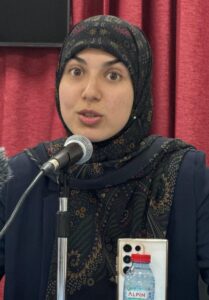 Syria under Bashar Al Assad has the interest of the West in wanting to topple Syria. If you want to look at the legacy of Bashar Al Assad. He lacked charisma and he did not manage to rally the masses. Syria operated as a supply route. A kind of transfer corridor for the Islamic Republic of Iran to be able to reach the Lebanese resistance. That was the relevance of Syria. Otherwise, it was not keen about the Palestinian cause. The Golan Heights was not a priority.
Syria under Bashar Al Assad has the interest of the West in wanting to topple Syria. If you want to look at the legacy of Bashar Al Assad. He lacked charisma and he did not manage to rally the masses. Syria operated as a supply route. A kind of transfer corridor for the Islamic Republic of Iran to be able to reach the Lebanese resistance. That was the relevance of Syria. Otherwise, it was not keen about the Palestinian cause. The Golan Heights was not a priority.
If you occupy Afghanistan and Iraq that is how you can reach Iran. Syria was forced out of Lebanon in 2005 in the wake of the assassination of Rafic Bahaa El Deen al-Harir. Syria was providing the political cover for the Islamic resistance in Lebanon. So right after Syria was forced to withdraw from Lebanon in the wake assassination. That was when the Islamic resistance was forced to enter the government.
The so called Arab Spring transformed Syria into an open arena as it was an area for the transfer of weapons. Through the intervention of Russia and Iran Bashar Al Assad was able to reestablish control over most of Syria. But if you are a government and are receiving external support it becomes difficult for you to consolidate your power.
The reason the West has been unable to bring about regime change in Iran because the people came out in support of the Islamic republic. It is not free from problems. Every single government has problems that need to be solved. But it was a people’s revolution. But when there was no relationship between the people and the government it was easy to topple the Syrian regime in that situation.
If you are an average Syrian you want to live in a stable society that is free from repression. You want a functioning economy. A lot of foreign fighters wee fighting in Syria. If a genuine revolution is to happen it has to be in the hands of the people. That is the only time you can support a revolution. The people in Iran went out onto the streets and wanted a change. If it was opposed by the people the people have no will in it they will not support the leadership.
In Syria direct confrontation failed so economic sanctions were used. There was hyper inflation. Trump prefers to influence a country through economic sanctions. He does not want boots on the ground. You strangle the people to the point where they will revolt against those in power. That is the way sanctions work.
So the reasons for the fall of the Syrian regime was that it was disconnected from the people. There was no meaningful communication between the regime and the people. It is very unfortunate that Bashar Al Assad did not develop Syria and to eliminate corruption. You had financial corruption in all the institutions of the state.
There was a failure of the Syrian government to each regional reconciliation with Turkey. Russia was willing to abandon Syria. The Gulf states tried to persuade Assad away from Iran. He avoided dialogue with the opposition.
In this new state you have US involvement. Trump was a lot firmer than Biden in opposing Turkey’s ambitions in the Middle East. He wanted to have Sunni Turkey fighting Shia Iran. American wants hegemony in the region. Under Trump the US is unlikely to intervene militarily in Syria. The UAE and Saudi may be given a role in Syria through a comprehensive dialogue.
Israel is seeing the opportunity to extend its influence and to control water resources. It will not withdraw from the areas it occupies. The new Syrian regime will not challenge or confront the Israeli occupation.
It is not very clear why Russia abandoned Bashar Al Assad. Its presence in Syria was an advantage for political and military influence in the Middle East. Europe is monitoring developments as they always do. Iran has withdrawn from Syria. Iran is not the kind to establish permanent military bases.
The military phase has concluded. The Syrian regime has been overthrown. The arms supply routes though Syria have been severed. The new government was not wanted by the people. The only difference was that Bashar Assad’s government was not in the western camp and this new government is. That is why foreign delegates are going to Syria to shake hands with the new rebranded Golani.
What we wish is for the Syrians to take control of Syria. Now there is a western sponsored partitioning of Syria, and the West wants Syria to be divided and they do not want resistance of Israel.
*Sami Ramadani is a senior lecturer in sociology at London Metropolitan University. Sami was born in Iraq and became an exile from Saddam Hussein’s regime in 1969, as a result of his political activities in support of democracy and socialism. He opposed the sanctions imposed on the Iraqi people (1991-2003) and the invasion of Iraq (2003). He is active in the movement to end the US-led occupation.
**The Revd Nadim Nassar (born 1964) is a Syrian-British Anglican priest, who is the Executive Director and Founder of the Awareness Foundation. He established the Awareness Foundation in 2003 with Bishop Michael Marshall in response to the growing need to study the Christian faith in the context of the 21st century.
In 2018, Nassar’s first book, “The Culture of God”, was published by Hodder & Stoughton. The BBC’s Edward Stourton said, ‘So much of the reporting of the Middle East at the moment reflects war and human misery; it’s inspiring to find, in this thoughtful and engaging book, a message of hope from what Fr Nadim calls “that region of the world that God chose to live in when he took human form”‘
***Batool Subeiti is a Lebanese-born Energy Engineer and political analyst activist based in the UK. She is Chemical/Energy Engineer by profession. She obtained her MEng Degree from the University of Birmingham. She is a regular article writer and contributor to outlets like Al-Mayadeen and Press TV. She has a special interest in analysing political and social issues, seeking to understand them from their root causes and from an angle otherwise not projected by mainstream

